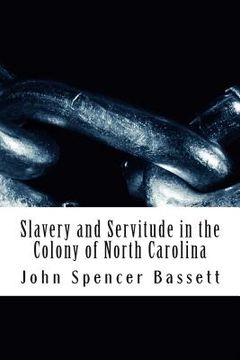Reseña del libro "Slavery and Servitude in the Colony of North Carolina (en Inglés)"
The lives of the American slaves were without annals, and to a large extent without conscious purpose. To get the story of their existence there is no other way than to follow the tracks they have made in the history of another people. This will be a slow and, in a sense, an unsatisfactory labor. At best it can give but a partial picture of the real life of the slaves, yet it can give all there is to give. Those who in these days of a clearer view and a broader sympathy have come to look on the former bondsmen as a race having their proper place in the evolution of the human family, must be content to gather up as many facts as can be found and to regret that circumstances have made it impossible to obtain a more complete story. To have come to America as a slave was not without an advantage to the negro, however disadvantageous it may be for his historian. The progress of a race is the lengthening of the experience of its earliest individuals. As each succeeding generation discovers new fields of knowledge, the experience of the former generation is thrust back to a stage in the individual's training previous to that which is considered the summit of an educated life. The facts which men now living are working out in laboratory and study will in a short time become a part of that general store of experience that will be standard knowledge for the schoolboy of the coming generation. That which any one learns from others is but the sum of the contributions made by those who have already lived. The experience which was the contribution of the earliest man must, therefore, be referred to a very early stage in the accumulation of this whole. Since his day the race has been but lengthening his life by successive steps in progress. Now, the negro when he came to America was far back in this stage of progress. It is usually agreed that for ages he had developed none at all. When he came from Africa he came into contact with the most advanced type of experience in the history of man. It was his task to learn that experience. Viewing the matter from the standpoint of his development, it was his chief task to learn it. How could he best learn it? The answer is, he must learn it as another person who stands to this experience in the same relation with the negro, that is to say, as a child. The same reasoning which in all social systems recognizes the expediency of placing the child under the dominant direction of his more experienced parent, will be effective in showing that in the days of the earliest contact of the white man and the black man it was a useful thing for the latter that he took his first lessons in civilization in the rigorous school of slavery. Hard as the process was on the spirit of liberty in the black man, and costly as it proved itself in the life, the treasure, and the slow development of the white man, yet it is difficult to see how the aimless, good-natured, and improvident African could ever have been brought as a race to plow, to sow, to reap, to study, and at length to create thought, except for the tutelage of his slave-holding master. The coming of the negro to the New World was due to economic causes. It arose from the meeting there of the two conditions of an abundant supply of undeveloped wealth and of a scanty supply of labor with which to develop it. This conjunction was due to a sudden widening of the spheres of industrial activities which in that day had been forced on the world. It was abnormal in itself and it led to an abnormal method of meeting it. It led to the forcible taking of men whose weakness made them unable to resist, and the bringing of them to work in the mines, forests, or fields on the American coasts.

